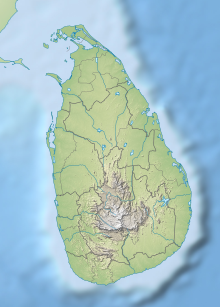Elephant rehabilitation facility in Sri Lanka
The Udawalawe Elephant Transist Home (Sinhala: උඩවලව ඇත් අතුරු සෙවණ, romanized: Udawalawa Ath Athuru Sewana)[1] is a wildlife protection facility within Udawalawe National Park in Sri Lanka that was established in 1995 by the Sri Lanka Department of Wildlife Conservation.
History
Sri Lankan elephants (Elephas maximus maximus) are an endangered species and their survival in their natural habitats is threatened due to human activities. Elephants in the wild are constantly being killed which caused many elephant calves to become orphaned. In order to support these orphaned elephants, the Department of Wildlife Conservation set up the Elephant Transit Home within Udawalawe National Park with help from the Born Free Foundation. The facility was established under the 29th Amendment to the Fauna and Flora Protection Ordinance Part II.[1]
Facilities and care
Up to three elephants per week are killed in Sri Lanka due to conflicts with humans, often leaving behind orphan calves.[2] The elephants are kept at part of the Udawalawe National Park to maintain familiarity with their habitat.[citation needed]
The centre houses information on elephants. Additionally, a solar heater was set up at the facility by Dilmah Conservation to heat the water used to make the milk fed to the orphaned elephants.

